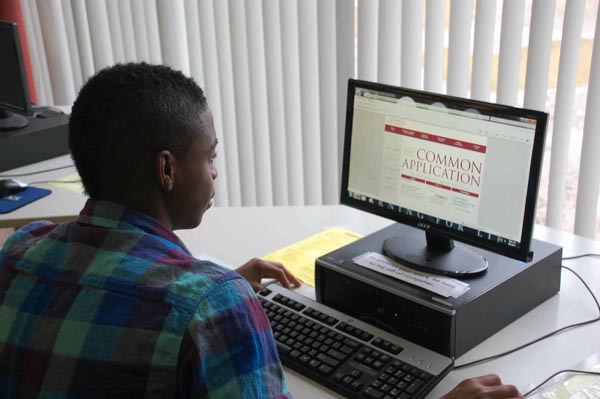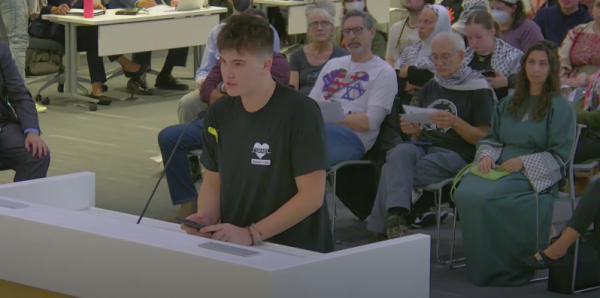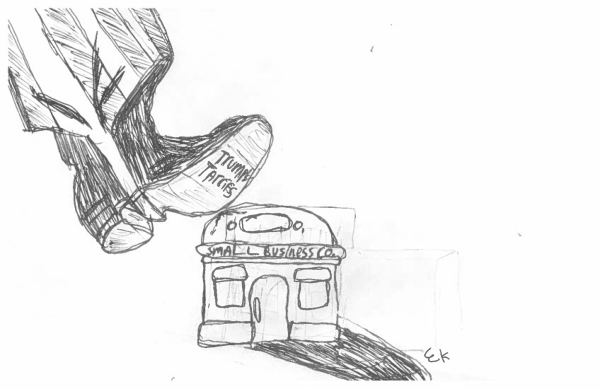College Advice to the Young’uns
A senior counsels underclassmen

I’ll be blunt: applying to college sucks. Just like buying a house, applying to college sometimes shows people’s dark sides.
Still, it doesn’t need to be as painful as many people make it. It can be tempting to only apply to one school that involves neither rec letters nor an (additional) essay, but that’s not The College Process.
This Process is a part of American culture that nobody likes, but it does give you something in common with every senior in the country.
So, for those of you who are still approaching this milestone, here is everything I wish I’d known two years ago.
As a Junior:
Take the ACT or the SAT at the beginning of junior year, so that you have plenty of chances to retake it if you want to up your score.
“Kids who are really self-motivated are able to do … online test prep,” guidance counselor Meghann Sullivan said. “Some kids are better off with a tutor, a class or something that’s more regular.”
I took a Kaplan class, and although I hated almost every minute of it, my scores improved drastically from my first practice test to my second SAT. Tutors can give you practice tests, but only some test prep companies can grade exactly how the College Board does. Also, check the testing policy of every school where you plan to apply. Some require SAT subject tests, which are tough to prepare for at the last minute.
Go on College Tours
Some parents think you can visit only the schools that accept you instead of visiting before you apply. WRONG. If you haven’t visited, it’s a lot more difficult to write an essay about why you love the school. You won’t have a feel for the university, which is something no admissions representative nor pamphlet nor video can give you.
When you do visit, it is of the utmost importance that you come prepared with questions and spend the night with a student. If you don’t know anyone, ask the admissions office or a student organization to find you someone to stay with. Students will give you the most accurate view of life at their school, whereas admissions officers and tour guides are paid to make the school look good. Ask every student you meet what their least favorite thing about the school is. If they talk about things like walking, parking, weather, etc., that’s a good sign.
“The first person to give their impression should be the kid,” when discussing how the visit went, not the parents,” Sullivan suggests.
“You don’t want to be swayed by other people’s opinions of the school,” she said. “It’s going to be you, not Mom or Dad who’s at the college for the next four to five years.”
As a Senior:
Listen to ‘Honestly Sincere’ from Bye Bye Birdie. Conrad Birdie’s advice is perfect for college essays.
‘You gotta be sincere/You gotta feel it here/’Cause if you feel it here/Well, then you’re gonna be honestly sincere. If what you feel is true/Really feel it you/Make them feel it too/Write this down now …’
Whatever you write, make sure it really shows who you are. Make them feel it, too. Never write what you think admissions officers wants to hear. Sullivan explains that colleges “want to feel like you are writing that essay for them. They don’t want a cookie-cutter essay that you could send to 50 different schools. They want to feel like there’s a reason you’re applying to that school.”
Many people would disagree with me, but that’s all the more reason it needs to be said: apply to the earliest deadline there is–Early Action, priority, etc.–but NOT Early Decision. I know it’s hard to be patient, but it’s worth it. The perk of applying ED is that the acceptance rate is sometimes higher. I believe that a rejection from most schools means you wouldn’t be able to do the work and maintain adequate mental health. So if you’re applying ED to increase your chances of getting in, not because you’re impatient, would you be able to do the work and still enjoy college?
Sullivan cautions students from becoming too fixated on one school.
“If you could look into the future, you could see 50 different … pathways that all could make somebody very, very happy,” she said. “It’s important not to start looking thinking there’s just one, right choice out there.”











